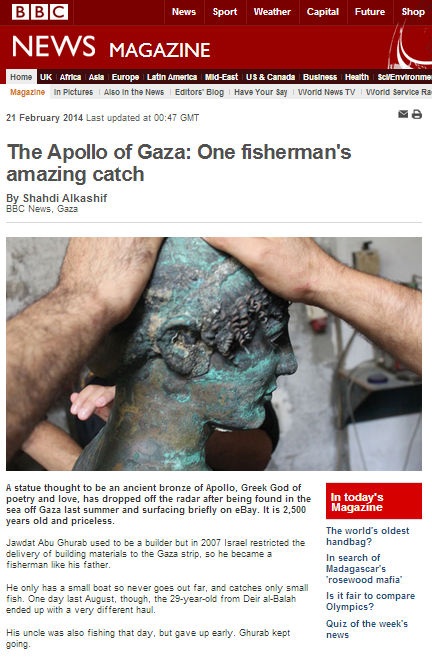On February 21st an article titled “The Apollo of Gaza: One fisherman’s amazing catch” by BBC Arabic’s Shahdi Alkashif appeared in the ‘Features & Analysis’ section of the Middle East page of the BBC News website as well as in its ‘Magazine’ section. An audio version of the report appeared on the BBC World Service programme ‘The Fifth Floor‘ and is also available as a podcast for a limited period of time.
In that audio version Shahdi Alkashif tells listeners:
“Gaza’s still, you know, under siege. There is no airports, there is no port, there is no any border with Gaza. The people cannot move out of Gaza.”
Not only is no context provided to listeners as to why restrictions of movement to and from a territory ruled by a terrorist group are necessary, but clearly Alkashif’s claim that “the people cannot move out of Gaza” is highly inaccurate and misleading. In the week February 9th to 15th alone, 3,550 people used the Erez terminal to enter or exit the Gaza Strip.
The written version opens:
“A statue thought to be an ancient bronze of Apollo, Greek God of poetry and love, has dropped off the radar after being found in the sea off Gaza last summer and surfacing briefly on eBay. It is 2,500 years old and priceless.
Jawdat Abu Ghurab used to be a builder but in 2007 Israel restricted the delivery of building materials to the Gaza strip, so he became a fisherman like his father.”
Uninformed readers are left with the mistaken impression that one day in 2007 Israel simply decided to restrict “the delivery of building materials to the Gaza Strip”. No mention is made by Alkashif of the all-important context of the violent coup which resulted in the Hamas take-over of the Gaza Strip and the subsequent escalation in missile fire at Israeli civilian targets which caused the designation of the Gaza Strip as ‘hostile territory’ by the Israeli government. Neither does Alkashif bother to inform readers what kind of building materials are restricted and to which projects and under what conditions they are permitted, or why it is necessary to control the entry of dual-purpose materials into a territory ruled by an internationally designated terrorist organization which uses concrete and other building supplies to construct cross-border tunnels for the purpose of carrying out terrorist attacks.
Further on in the report Alkashif does state that “..the smugglers’ tunnels – dug to circumvent restrictions put in place by Israel and Egypt after the Islamist movement Hamas came to power in Gaza – have been out of action since they were closed by the Egyptian army last summer” but again insufficient background is given as to why such “restrictions” were necessary.
And what of Jawdat Abu Ghurab’s employment history? Well, that seems to be rather flexible. At the end of January an article on the exact same subject appeared in Bloomberg Business Week. In that report it is stated that he has been a fisherman since 2005.
“Ghurab, a fisherman, is 26, and has a wife and two sons. He left school at 13 and has been fishing since he was 17.”
And according to the same article, Ghurab’s CV also includes other activities:
“For a while Ghurab made money digging some of the smuggling tunnels under the Egyptian border and helped shuttle contraband—from washing machines to hives of Egyptian honeybees—but that money dried up when Egypt cracked down on trafficking.”
Later on in the article Alkashif states:
“After four hours they succeeded in getting the object out of the water. It was the statue of a naked man. They loaded it on to a cart and took it to Ghurab’s house.
“My wife covered her face when she saw him lying naked in the house. She begged me to cover it,” he says, laughing.”
A Reuters report on the same story which appeared in the Guardian on February 10th states however:
” “I felt it was something gifted to me by God,” Ghrab told Reuters. “My financial situation is very difficult and I am waiting for my reward.”
His mother was less happy when she saw the naked Apollo carried into the house, demanding that his private parts be covered. “My mother said: ‘What a disaster you have brought with you’ as she looked at the huge statue,” said Ghrab.”
Unlike Alkashif’s version of the story, other reports on the same subject – including that one from the Guardian, one in the Independent and one which appeared in the Jerusalem Post – have noted that experts are sceptical as to whether the statue was actually found in the sea.
” “It’s unique, said Jean-Michel de Tarragon, an historian with the French Biblical and Archaeological School of Jerusalem. […]
“It’s very, very rare to find a statue which is not in marble or in stone, but in metal,” he said, adding that the apparent pristine condition of the statue suggested it was uncovered on land and not in the sea, as claimed.
“The one of Gaza is very special and unique because for us, it has not been, at all, found in the sea… It has been found, we don’t know exactly the place, we have a guess you know, in the north of Gaza….But it has been found surely, in the sand,” he said, adding that there were no tell-tale signs of metal disfigurement or barnacles that one normally sees on items plucked from water.
De Tarragon says the claim the statue was found in the sea is probably just a convenient story told to avoid arguments over ownership, particularly if the treasure was found on someone else’s land.”
The Times of Israel quotes a Gaza-based archaeologist as saying:
“…the statue, with its green patina, was unlikely to have come from beneath the waves.
“It is 90 percent intact and was probably found on land,” he told AFP. “If it had spent time underwater, the bronze would be blackened.”
“It’s more likely that the statue was found in an ancient temple in the Gaza area. We need to search and find out,” he said.”
Whatever the truth behind the discovery of the statue and whatever the reasons behind the timing of the story’s sudden extensive promotion in the international media some six months after its initial discovery, one thing is certain: Shahdi Alkashif’s context-free introduction of Israeli ‘restrictions’ on the entry of building materials to the Gaza Strip into the story and his claim that “people cannot move out of Gaza” are both misleading and gratuitous and can only be seen as being politically motivated insertions.





